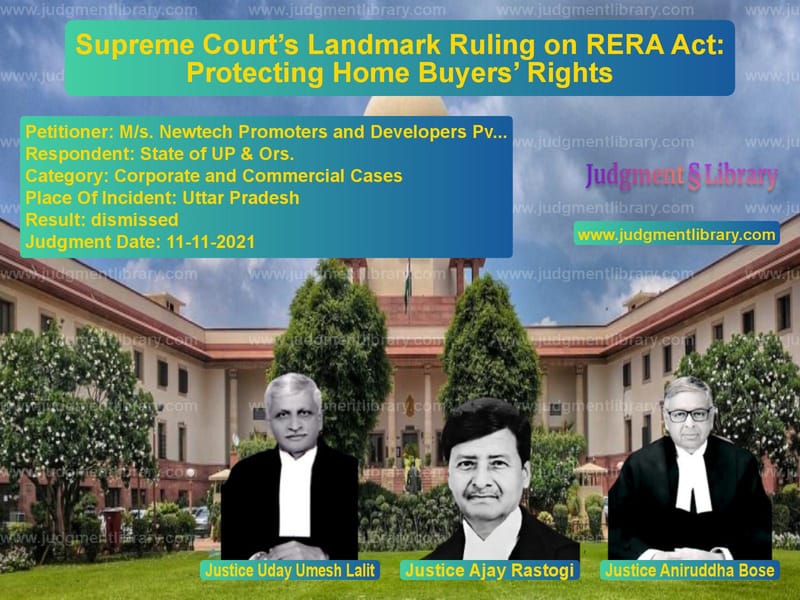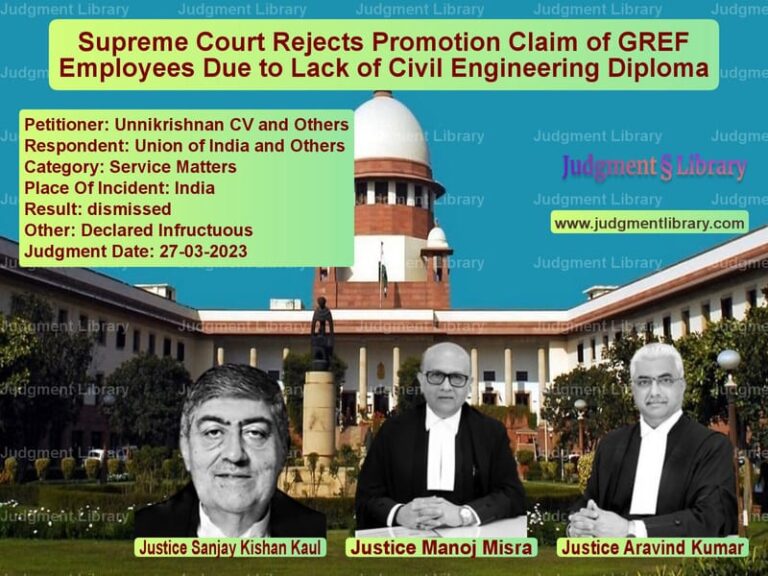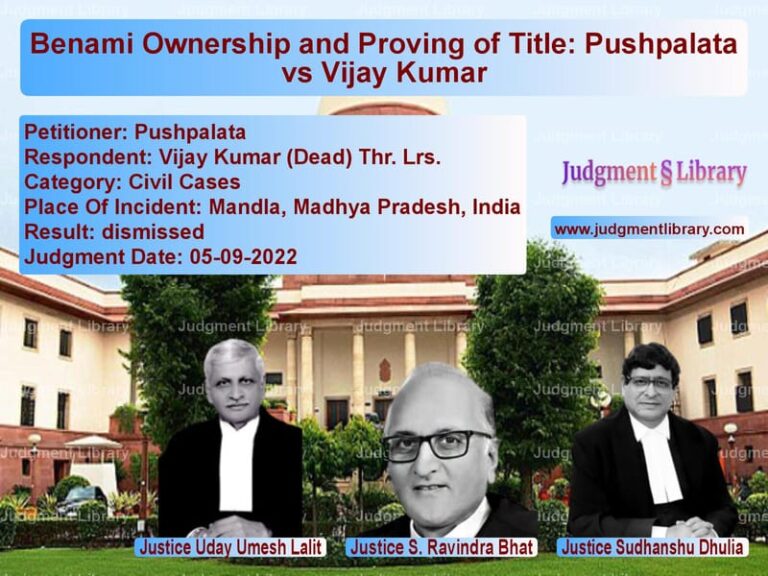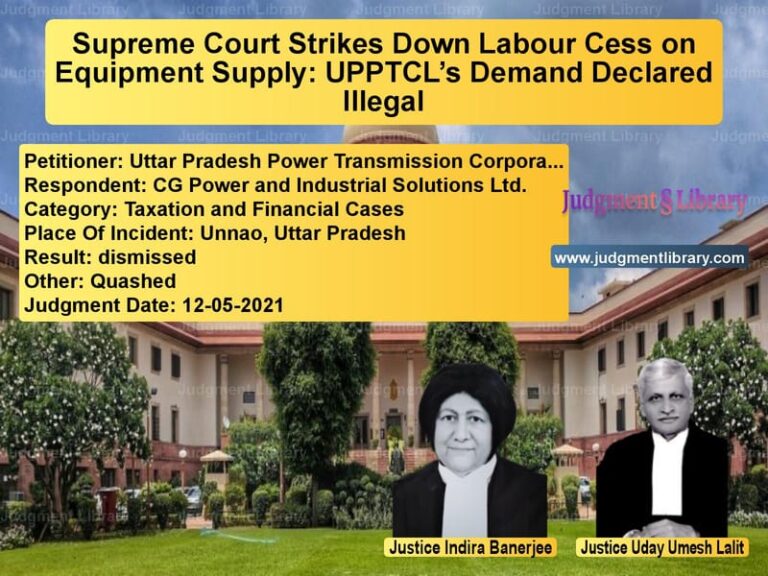Supreme Court’s Landmark Ruling on RERA Act: Protecting Home Buyers’ Rights
The Supreme Court of India has delivered a crucial verdict in the case of M/s. Newtech Promoters and Developers Pvt. Ltd. vs. State of UP & Ors., addressing major concerns related to the implementation of the Real Estate (Regulation and Development) Act, 2016 (RERA). This ruling clarifies multiple aspects of the Act, including the rights of home buyers, the jurisdiction of RERA authorities, and the mandatory pre-deposit condition for developers when filing appeals.
Background of the Case
The case arose when multiple home buyers approached the Uttar Pradesh Real Estate Regulatory Authority (UPRERA) against M/s. Newtech Promoters and Developers Pvt. Ltd. for failure to complete and deliver their residential units within the agreed timelines. The home buyers alleged that they had invested their hard-earned money in the project, trusting the promises made by the developer. However, despite receiving payments, the builder neither completed the project nor refunded the buyers.
Following complaints from the home buyers, UPRERA issued orders under various sections of the Act, directing the promoter to refund the amounts paid by the buyers with interest. The developer, instead of appealing before the Appellate Tribunal with a mandatory pre-deposit under Section 43(5), directly filed writ petitions before the High Court, challenging the orders issued by RERA.
Key Issues Before the Supreme Court
The case was brought before the Supreme Court with the following key issues:
- Whether RERA applies retroactively to projects that commenced before its enactment but had not received a completion certificate.
- Whether RERA authorities have the jurisdiction to order refunds under Sections 12, 14, 18, and 19.
- Can a single member of the RERA authority hear complaints under Section 31?
- Is the mandatory pre-deposit requirement under Section 43(5) for filing an appeal valid?
- Whether RERA authorities have the power to issue recovery certificates for refund enforcement.
Petitioner’s Arguments (Developer’s Stand)
The developer, M/s. Newtech Promoters, contended that:
- RERA should not apply to projects initiated before the Act came into force.
- The orders passed by UPRERA were outside its jurisdiction as refund and compensation fall under the purview of an adjudicating officer, not the authority.
- Requiring a single member to adjudicate disputes violates the principles of natural justice.
- The pre-deposit requirement for filing an appeal under Section 43(5) was excessive and arbitrary, placing an unfair financial burden on developers.
- RERA authorities lack the power to issue recovery certificates enforcing refunds.
Respondent’s Arguments (Home Buyers and State of UP)
The home buyers and the State of Uttar Pradesh countered with the following arguments:
- RERA was enacted to regulate real estate transactions and protect home buyers from fraudulent practices.
- The Act explicitly covers ongoing projects that had not obtained a completion certificate before its enactment.
- Sections 12, 14, 18, and 19 empower RERA authorities to grant refunds in cases of non-compliance by developers.
- The provision requiring a single-member bench to hear complaints is aimed at expediting dispute resolution.
- The pre-deposit condition ensures that only genuine appeals are entertained and prevents developers from using delaying tactics.
- The issuance of recovery certificates is necessary to enforce refund orders and prevent developers from escaping liability.
Supreme Court’s Observations and Ruling
1. Retroactive Application of RERA
The Supreme Court held that RERA applies to all ongoing projects that had not received a completion certificate before the Act’s commencement. The Court stated:
“Projects that were incomplete at the time RERA came into force are subject to its provisions, as the primary intent of the Act is to protect home buyers from delays and malpractices.”
2. Jurisdiction of RERA Authorities
The Court ruled that RERA authorities have the power to grant refunds under Sections 12, 14, 18, and 19. It clarified that:
“While adjudicating officers deal with compensation claims, the authority itself can direct refunds where a breach of obligations by a developer is established.”
3. Single-Member Bench Validity
The Court upheld the validity of single-member adjudication, reasoning that it ensures swift resolution of disputes:
“In light of the increasing number of complaints, the delegation of power to a single member is justified and does not violate the principles of natural justice.”
4. Mandatory Pre-Deposit Under Section 43(5)
The Court rejected the developer’s challenge to the pre-deposit requirement, emphasizing that it serves as a deterrent against frivolous appeals:
“The requirement of depositing a portion of the awarded amount before filing an appeal prevents developers from misusing the appellate process to delay payments.”
5. Power to Issue Recovery Certificates
The Court confirmed that RERA authorities are empowered to issue recovery certificates for enforcing refund orders:
“The power to recover dues ensures that home buyers are not left without a remedy when developers fail to comply with orders.”
Final Judgment
The Supreme Court ruled:
- RERA applies to all incomplete projects that had not received a completion certificate at the time of enactment.
- RERA authorities have jurisdiction to direct refunds but not to award compensation.
- Single-member benches are valid for adjudicating complaints.
- The mandatory pre-deposit condition under Section 43(5) is constitutionally valid.
- RERA authorities have the power to issue recovery certificates to enforce refund orders.
Impact of the Judgment
This landmark judgment strengthens the regulatory framework for real estate transactions and enhances protection for home buyers. Its key implications include:
- Developers cannot escape liability by claiming that RERA does not apply to ongoing projects.
- Home buyers now have a stronger mechanism to claim refunds in case of delayed or non-delivered projects.
- Frivolous appeals by developers will be curtailed due to the mandatory pre-deposit requirement.
- RERA authorities can enforce compliance through recovery certificates, ensuring that refunds are paid.
Conclusion
The Supreme Court’s ruling in this case is a landmark decision that reinforces the objectives of RERA in protecting home buyers. By upholding the pre-deposit condition, affirming the power of RERA authorities to grant refunds, and clarifying the applicability of the Act to ongoing projects, the Court has provided much-needed clarity and stability in the real estate sector. This judgment ensures that home buyers’ interests remain safeguarded against delays and malpractices by developers.
Read also: https://judgmentlibrary.com/supreme-court-upholds-limitation-in-insolvency-appeals-under-ibc/
Petitioner Name: M/s. Newtech Promoters and Developers Pvt. Ltd..Respondent Name: State of UP & Ors..Judgment By: Justice Uday Umesh Lalit, Justice Ajay Rastogi, Justice Aniruddha Bose.Place Of Incident: Uttar Pradesh.Judgment Date: 11-11-2021.
Don’t miss out on the full details! Download the complete judgment in PDF format below and gain valuable insights instantly!
Download Judgment: ms.-newtech-promote-vs-state-of-up-&-ors.-supreme-court-of-india-judgment-dated-11-11-2021.pdf
Directly Download Judgment: Directly download this Judgment
See all petitions in unfair trade practices
See all petitions in Corporate Compliance
See all petitions in Company Law
See all petitions in Bankruptcy and Insolvency
See all petitions in Mergers and Acquisitions
See all petitions in Judgment by Uday Umesh Lalit
See all petitions in Judgment by Ajay Rastogi
See all petitions in Judgment by Aniruddha Bose
See all petitions in dismissed
See all petitions in supreme court of India judgments November 2021
See all petitions in 2021 judgments
See all posts in Corporate and Commercial Cases Category
See all allowed petitions in Corporate and Commercial Cases Category
See all Dismissed petitions in Corporate and Commercial Cases Category
See all partially allowed petitions in Corporate and Commercial Cases Category







